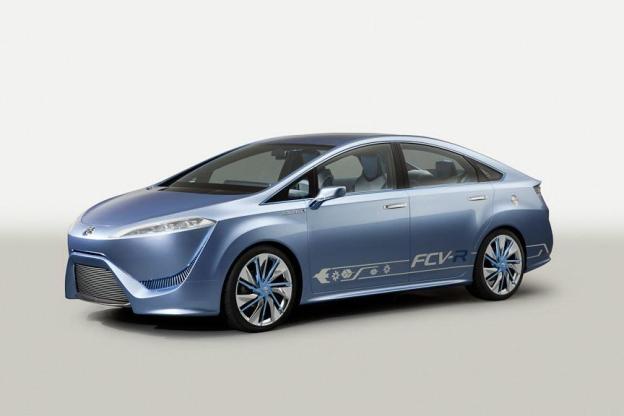
Here comes hydrogen! Yes, Toyota aims to replicate the success it had with the world’s first production hybrid, the Prius, with a mass-market hydrogen car for the 2015 model year.
Presumably based upon its FCV-R concept from a few years ago, the as-yet unnamed hydrogen-powered production model would cost between $50,000-$100,000 and have a range of 300 miles. This might not bee too expensive for eco-minded buyers, however, Toyota has reportedly pegged the Tesla Model S as a pricing rival.
This, of course, did not make Tesla CEO Elon Musk very happy. “Fuel cells should be renamed ‘fool cells,’ they are so stupid,” said Musk in an interview a few weeks ago, according to Bloomberg. “You could take best case of a fuel cell, theoretically the best case, and it does not compete with lithium-ion cells today. And lithium-ion cells are far from their optimum.”
Although Honda and Hyundai have beat Toyota to the market with hydrogen fuel cell-powered production vehicles, both were offered in a very limited scope. If Toyota wants to recreate the success it had with the Prius, it will have to offer the hydrogen fuel cell cars on a wider scale than its competitors.
Early hydrogen cars cost upwards of $1-million to build. Thanks to dozens of technological breakthroughs in the last few years, including several improvements to the design of hydrogen catalysts, the green technology is now much cheaper to produce.
Hydrogen-powered cars don’t “run on hydrogen” in the same way as a gasoline-powered internal combustion engine operates. The gas, which is one of the most plentiful in the universe, can be made from seawater and other sustainable sources, and is utilized in an in-car “fuel cell” that generates electricity for the car’s electric motor or motors. The waste product of a fuel cell is pure water (H2O).
Fuel cell technology is nothing new either. NASA began using the devices to power spacecraft decades ago. The main problem facing hydrogen-powered cars is a lack of infrastructure (i.e. hydrogen “gas stations”).
Next week, Digital Trends will be heading to southern California to drive a pre-production version of the Toyota hydrogen car as well as a Mercedes F-Cell and a Hyundai fuel-cell car. If you’re keen to know what its like to drive and own a hydrogen car before they hit the market, be sure to check back for our special reports.


